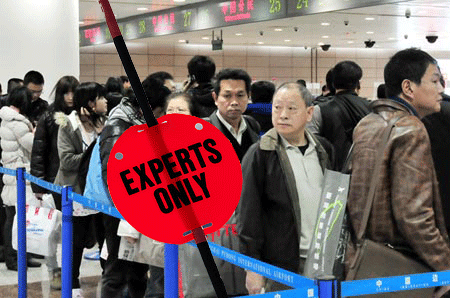 Next time I come through immigration at Pudong airport, I’m expecting there to be three lines for admission into the country — Chinese nationals, visitors, and China experts. Becoming an expert commentator on China’s economy now seems to require less qualification or preparation than getting a driver’s license in Lanzhou.
Next time I come through immigration at Pudong airport, I’m expecting there to be three lines for admission into the country — Chinese nationals, visitors, and China experts. Becoming an expert commentator on China’s economy now seems to require less qualification or preparation than getting a driver’s license in Lanzhou.
My latest case in point isn’t even Shaun Rein, instead it’s a column by another Forbes contributor, about how China is welcoming in multinationals in ever greater numbers, and the proof used to support this dubious claim is a combination of figures on the take up of business park space and retail sales statistics.
The column in question is by Forbes’ Kenneth Rapoza who is listed as “covering Brazil, Russia, India & China” (no wonder the poor guy struggles to back up his assertions — he’s attempting the journalistic equivalent of playing first base, left field, catcher and shortstop all at the same time), in which Mr Rapoza gushes,
Shanghai is fast becoming the Hong Kong of the mainland. One wonders what the former capital of Asia, Tokyo, thinks about all this. One thing is certain, Shanghai is new, Shanghai is open for business, Shanghai wants more corporations renting office space.
Well, I am not sure what it means to be the “Hong Kong of the mainland,” especially when Hong Kong more or less considers itself the Hong Kong of the mainland, but although Shanghai certainly wants more corporations renting office space, very little of the space being taken up by foreign corporations is being done at the expense of Tokyo.
Instead, the corporate headquarters being set up in cities such as Shanghai is a result of the rapid increase in scale of companies operating in China, both local and multinational. How do I know about this? Because RightSite operates China’s largest directory of business parks, so people looking for that space often come through us.
As for Shanghai being “open for business,” I think Deng Xiaoping kind of opened the door for that a few years back, but if anything, that door is being closed in 2012 more than its being opened. While China definitely would like foreign companies to spend money here, the country’s leadership is ambivalent about how long they want these companies to stay around, and how deeply they want foreign firms to integrate into China’s economy.
So without further ado, here are….
Mingtiandi’s 5 Ways China is Pushing Foreigners Out
1. New social benefit taxes on expatriate employees
Starting in 2012 foreign employees (who are at least 90% employed by foreign companies) are now being charged 48% of their salary for social benefits that they will never collect. The Chinese government can spin this how they like, but this is essentially a tax on foreign companies operating in China.
2. The end of incentives for foreign investment in key industries
China no longer wants foreign-funded automobile factories or polysilicon plants — so you folks can just stay in Detroit, or Wolfsburg or wherever.
3. The continuing closed door policy on foreign investment in many industries
Leaving aside any issues of investment incentives, there are many economic sectors in China that remain closed to foreign investment since Deng opened the door in the 1980s, and probably always will remain off-limits. Foreign companies are completely shut out of industries such as mining, power generation and transportation, and while there is some limited participation allowed in media, telecoms and technology, the guys at Google might want to check the wiring very carefully before plugging in their servers in one of Shanghai’s welcoming new business parks.
4. The domestic innovation program
Basically, if you are foreign company looking to get access to the market in China, then you had better be willing to share your technology. Of course, just like it was when you lent your comic books to your kid brother, once you share things, they can be hard to get back.
5. The end of mortgages for foreigners
Just in case the foreign executives working for those warmly welcomed multinationals still had any illusions about making use of their social benefit contributions someday, they had better be prepared to do so while renting their homes, since the NDRC effectively cancelled home financing for non-Chinese nationals this year.
None of this is to say that China is a lousy place to do business or that foreign companies cannot make money here. However, international firms do need to notice that they are welcome as long as they play their role, and that they may only be guest stars.
Have you got other reasons why you think that foreigners may be less welcome than they used to be? Feel free to leave a comment below.
Leave a Reply